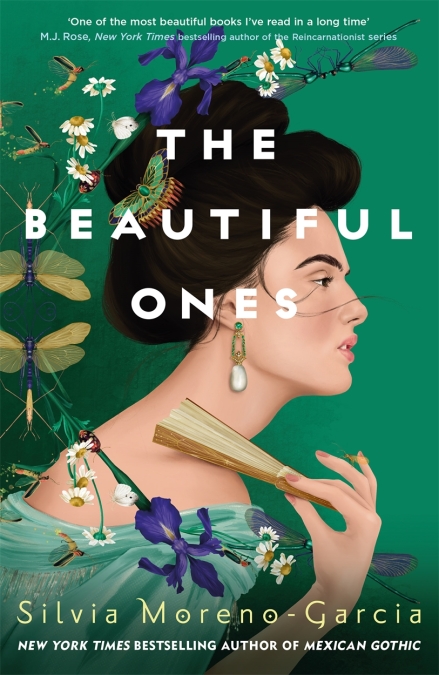You are viewing your 1 free article this month. Login to read more articles.
Silvia Moreno-Garcia talks about publishing and her upcoming novel
The genre defying Silvia Moreno-Garcia, who writes in her second language, talks fantasy, nurturing writers and how to make fiction pay off.
Silvia Moreno-Garcia felt that she might have been done with speculative fiction, before Mexican Gothic (Quercus) came out in 2020. Her first few novels had won her a handful of nominations and awards, from début Signal to Noise (Rebellion), about love, magic and music, to historical fantasy Gods of Jade and Shadow (Quercus). But the sales just weren’t there, and she felt she might need to switch genres to keep the money coming in.
But Mexican Gothic changed everything. Set in 1950s Mexico, it is a feminist, postcolonial spin on the gothic romance, in which Noemí travels into the countryside to rescue her cousin from the clutches of a man she says is poisoning her. It is absolutely, joyfully brilliant: a slice of gothic horror I’ve recommended to everyone I can.
“Publishing is a game of snakes and ladders,” Moreno-Garcia says, speaking on Zoom from her home in Vancouver. “You win an award and it looks nice, but it doesn’t necessarily correlate to sales, and it doesn’t necessarily correlate to a long-term career either. I think it’s more difficult when you’re a person of colour—there are all these built-in mechanisms that make it easier for you to fail, harder to succeed and more difficult to have a long-term career.”
She wrote Mexican Gothic because it was a book she “needed to write, not knowing how well or how poorly it might do, hoping that I still had the chance to do more books in the future. But kind of feeling that maybe I needed to change genre for mental health reasons and also because there might not be much of a space for me in speculative fiction. My career was not doing very well and I was fed up with it.”
It became her biggest seller to date, and meant that she could stick with the speculative. Her next novel will be a reimagining of The Island of Doctor Moreau, set against the backdrop of 19th-century Mexico, out in July from Del Rey in the US and Jo Fletcher Books in the UK. And some of her backlist, which had come out without huge fanfare, is getting a new lease of life.
I’ve always thought of my career as a series of small failures in order to gain a foothold
We are here today to talk about her gorgeous historical fantasy The Beautiful Ones, first published in the US in 2017 but just out in paperback in the UK in April. It’s the perfect treat for fans of Georgette Heyer and “Bridgerton”; a slice of historical romance spiced up with a little magic, in which Nina’s début at the Grand Season goes awry thanks to her telekinetic abilities. When she meets Hector, who has his own telekinetic talents, she falls for him. But he has a history with Nina’s cold, beautiful cousin Valerie.
“I wanted to try my hand at something that played with the novel of manners. I’m a big reader of those kinds of books—Edith Wharton, and what is called costumbrismo in Spanish,” Moreno-Garcia says. “I thought it would work well if I injected a slight sort of fantastic element to it, without calling it magical realism, because I have a lot of problems with that term. So it became what I consider to be a novel of manners with a little bit of a fantasy in it, as opposed to a fantasy.”
Crossing genre
Moreno-Garcia, who is astonishingly versatile in her writing, has also managed to fit a noir thriller into the mix, publishing the superb Velvet Was the Night (Quercus) last summer. Set in 1970s Mexico City, after the student massacre known as “El Halconazo”, it is the story of Maite, a secretary who dreams of romance, and who sets out to find her neighbour when she disappears. Elvis, a criminal, is also looking for the missing Leonora.
“I wanted to do something different after writing several things in the fantastic space,” she says. “Maite and Elvis are anti-noir characters—she considers herself to be an irritating spinster, she’s a bit of a kleptomaniac on the side and lives a rather dull and uninteresting life. Part of that is playing with those expectations of what the reader thinks.”
Moreno-Garcia has written since she was a child, but “didn’t really do a good job of it” until she was in her mid-twenties, when she started writing science fiction and fantasy short stories and getting them published in fanzines and semi-pro zines. “I got in not through the front door but through the back door of fiction, through the alleyways, and I like that. I believe that if I had an MFA and an academic background, I wouldn’t have become a writer,” she says. “When I was writing all that short fiction, I really, really needed the money. I needed $10 or $20 or $25, desperately. Writing was an escape route for me from my real life, but it also came with these tiny little pay cheques.”
She and her husband had emigrated from Mexico to Canada at the time; they had a baby, and “it was really tough financially”. “My husband was working two or three jobs, waiting tables and sleeping for three hours, then waiting more tables. I was with a baby at home, writing when my baby fell asleep,” she says. “Rather than watching TV, I was reading and I was writing. I thought I could write my way to a better life, essentially.”
She chose to write in English—Spanish is her first language—because “it was the most practical thing. I wanted to write fantastic fiction at the time, and there are no fantastic fiction imprints in Mexico, or in most of Latin America, and there were very few in Spain at the time.”
Moreno-Garcia started a magazine and a small publisher, Innsmouth Free Press, publishing anthologies—one of which, She Walks in Shadows, a collection of Lovecraftian tales by women about women, won a World Fantasy Award. Her first novel Signal to Noise came out in 2015, but she has always also worked in corporate communications—until December 2021, when she went freelance to focus more on fiction.
“I’m very cautious, so I turned in my resignation after I had done a lot of math and talked to my accountant, and he said that my math looked good. I have to support my whole family, so if I don’t make enough money then nobody eats over here, so that’s a bit of a problem. But I’m feeling like things are good right now, so at least in the next few years, things are stable enough that I can try to do this full-time,” she says. “I’ve managed to survive all these ups and downs in a career, so I’ve been around for a while, and I’ve built a bit of an audience, too.”
Things are even harder, she thinks, for writers starting out today. “Publishing right now is not as supportive of midlist writers as it used to be. There is this expectation that writers must have a hit out of the gate, and when you see all those big advances that come with big figures, it’s normally for first novels and untried writers, who, if they fail spectacularly, never get a chance to do anything again. I’ve always thought of my career as a series of small failures in order to gain a foothold,” she says. “It’s just really sad that nowadays there is not a lot of nurturing or holding your hand through that journey. It’s an ‘If you didn’t BookScan enough then you’re out of here’ sort of situation.”











